- Home
- Sarah Price
The Faded Photo Page 15
The Faded Photo Read online
Page 15
“But a fever, Madeline,” Frances said patiently. “You know what the nursing staff says. You have to contact them if you run a fever.”
Madeline waved her hand at Frances. “Bah! I’ve been doing this for two years. I’m tired of the hospital.”
After just a few weeks, Frances felt the same way. But she knew that fevers were not something to be trifled with.
“Even so, I think it’s best that you go, Madeline. How about if I accompany you? If it’s truly nothing, we can come right back.”
Reluctantly, Madeline eventually agreed.
Frances hadn’t considered how to get Madeline over to the hospital. She also hadn’t figured that the staff at Pine Acres had a plan for such situations and it didn’t involve merely walking out the front door and crossing the street. Instead, an ambulance had to be called, and Madeline needed to go on a stretcher. After all of the fuss and delays, she was almost sorry that she had talked Madeline into going. After all, the older woman did, indeed, look fine.
It took almost an hour for Madeline to get situated in the emergency room. Fortunately, because she came in from the nursing home and they had called ahead, Madeline received preferential treatment. Frances waited with her in one of the back rooms until someone came to check her vitals.
“Let’s just get some blood drawn before we check your temperature and blood pressure,” the young man said. He didn’t get into any personal conversation, and Frances thought briefly about Laura from the Chemo Cocktail Lounge. Surely it took a special person to be a nurse in the oncology department, someone with great compassion and love for other people. This man, however, was all about business, and his business was about moving on to the next patient. Draw blood, send to the lab, continue with the next case.
“Blood pressure is a little high but not too bad,” he said, jotting something down on a form before he wrapped up the equipment. “I’ll send this to the lab, and someone will be in shortly.” Without another word, he left the room.
“Pleasant fellow, eh?” Madeline commented. “Any wonder why I hate coming here?”
Frances straightened out the white blanket that covered Madeline’s legs.
“Now, now, Madeline. ER staff is different. It’s not like they have time to establish a relationship, not like the nurses we are used to dealing with.” She smiled at her friend. “Would you like something? Water? Ginger ale?”
When she returned from fetching Madeline a can of ginger ale and a cup of ice, a nurse was already in the room and setting up an IV. Frances frowned and glanced at Madeline.
“What’s this?”
The nurse glanced over her shoulder. “Fluids. Her fever is too high.” Her eyes fell down to the can of ginger ale in Frances’s hand. “Oh, that’s great. If she can drink that, too, it will help.”
Frances nodded, opening the can and pouring some into the cup. She handed it to Madeline as her cell phone rang from her purse. Setting the half-full can on the counter, Frances dug into her purse to retrieve the phone. Someone from home was calling.
“Where are you?”
Frances glanced at the clock, surprised to see that it was already nine o’clock. “A friend of mine is sick, Nicholas. I’m with her at the hospital.”
“Charlotte?”
Even though he couldn’t see, she shook her head. “No, someone else. You don’t know her.”
He didn’t ask any further questions. “You know that I’m leaving in the morning, right? I’m trying to find my suitcase.”
Her heart ached. Perhaps she had thought he actually had missed her. At least worried about her. It was rare for him to return home and not find her. But his question quickly corrected that misguided notion. With a deep sigh, she turned her back to Madeline and lowered her voice.
“It’s in the guest room. I put it away after I unpacked it on Friday night.”
“Thanks.” He barely said good-bye before he hung up, leaving Frances with the phone pressed against her ear and a lump in her throat. Just once, couldn’t he say something kind to her? A word of endearment? Ever since she had gone to his office, he had been acting even more cold and detached, leaving her to wonder what, exactly, was going on.
Madeline cleared her throat. “You don’t have to stay with me, Frances. I suspect you have your family waiting for you.”
Shoving her phone back into her purse, Frances turned to face Madeline. “No, it’s fine. The children will be going to bed soon, and my husband is packing for a trip.”
“Children? How old?”
It struck Frances as odd that here she was, in the emergency room with a woman who had used her as an emergency contact—despite claiming that she hadn’t thought Pine Acres actually would contact her!—and yet, they knew so little about each other.
Sitting down in the chair next to Madeline’s bed, Frances took a deep breath. “Let’s see. My son Andy is sixteen and goes to Morristown High School. He plays football and gets decent grades. Carrie is twelve and goes to Frelinghuysen Middle School, also in Morristown. She likes ballet and is in that stage where she’s a bit mouthy. Knows everything, and I, her mother, am just a foolish older woman who couldn’t possibly have any knowledge about anything relevant to her.”
Madeline smiled in a knowing sort of way.
“How about you? I know you have a son . . . ?”
“James, yes. He’s about your age, maybe a few years older. Fifty-two.”
“More like ten years older,” Frances was quick to point out with a smirk.
“Cancer ages us.” It was an apology for having overestimated Frances’s age. “I also have two daughters, but one lives in Texas and the other over in London with her family. I haven’t seen them in years.”
“That’s a shame.”
Madeline shrugged her shoulders. “Ever since they were teenagers, they weren’t as close to me as they should have been.”
Frances wondered why but didn’t want to ask.
“My husband died ten years ago, and that was the beginning of the end of any relationship with the girls. James lingered on for a while, but his wife, Dina, worked her magic.” She grimaced. “I became the evil mother-in-law that every wife loves to complain about.”
“I find that hard to believe.”
“Me, too.” Madeline winked at her. “But James’s wife loves to create her own reality. And I did not fit into it. Although, I confess, it wasn’t as if I really tried. We just don’t see eye to eye on things.”
Frances hadn’t thought about her own mother-in-law for a while. She did not particularly care for Ellen Snyder. She was abrupt and judgmental, quick to share her opinions and even quicker to dismiss others’, especially if they came from Frances. With only sons, Ellen always favored anything and everything that Nicholas said and Andy did. Fortunately, she did not live close enough to just pop in unexpectedly, and more often than not Nicholas visited her rather than her traveling to visit the family in Morristown.
“How about your own children? How have they taken the news about your cancer?” Madeline asked.
Frances startled at the question. “My children?”
Madeline raised an eyebrow and waited expectantly.
“Oh, uh . . .” Frances didn’t know how to admit the truth. Fortunately, she didn’t have to, as someone interrupted their conversation.
“Ah, Mrs. Cooper,” a young doctor in a white jacket said as she walked into the room. Two younger women trailed behind her, their blue coats clearly delineating their status as interns. “How are we feeling?” she asked as she reached down to touch Madeline’s wrist.
“I feel fine. But I don’t know about you,” Madeline quipped back.
The doctor nodded, her eyes on the clock behind the bed. When she finished counting, she gently released Madeline’s arm. “Well, your blood work does not say the same, I’m afraid. Your white blood cell count is very low. We’d like to admit you. Between the low white cell count and your high fever, we want to keep you on fluids and under observation. If the white blood cell
count doesn’t increase, we’ll need to administer a blood transfusion.”
“Can you make it a young woman?”
The doctor blinked. “Excuse me?”
“Blood from a young woman, preferably smart and gorgeous, please.”
Frances smiled at Madeline’s teasing comment while the doctor appeared to realize that her patient was making light of the situation’s severity. Finally she smiled.
“I can see what we can do to accommodate your request,” she said and pressed her hand on Madeline’s shoulder. “In the meantime, you’ll need to rest up and take it easy. We don’t want you getting an infection that your body can’t fight.” She motioned to the two people with her. “They’ll take you to Franklin Four. Fortunately, we already have a room ready. It’s private, so I want to move you there right away. You never know when someone might steal it away from you.” She winked at Madeline and turned to talk to the two interns. “Transport is coming, yes?”
They stepped outside the door to finish conferring about Madeline.
“See? It’s good that you came here,” Frances said, trying to sound cheerful. “And you said you don’t like Pine Acres anyway.”
But Madeline was clearly not jubilant.
“I’ll come visit you tomorrow. How’s that?” It was, after all, going to be Monday. With Nicholas gone and the children at school, it wasn’t as though Frances had too much else on her schedule.
She waited until the transport person came to move Madeline, one of the interns making certain that the IV fluids did not get tangled as the man moved the bed. Frances watched as the hospital bed was pushed down the hallway, the team of medical people following close behind. It saddened her to think about Madeline, a fine woman with a good sense of humor who had no family to fuss over her.
And then Charlotte’s words floated back through her mind, yet again. Lifting her chin, Frances shoved the memory away and started walking toward the exit. After all, she did have family waiting at home for her, even if everything wasn’t exactly the way she would have liked it. But she had family at home, something both Charlotte and Madeline did not.
CHAPTER 15
“Good morning, Mrs. Snyder!” the nurse said immediately as Frances stepped out of the elevator. For the fourth day in a row, she was visiting Madeline at the hospital. It had become part of her routine. By this time, she was convinced that everyone thought she must be the older woman’s daughter, and for some reason she didn’t bother correcting them.
“Good morning. How is she today?” Frances asked as cheerfully as she could muster.
“She’s ornery as always.” The answer came with a slight laugh. “But definitely doing better.”
Frances knocked on the door before opening it, a habit that she’d developed at home. Privacy was important for teenagers, and since she’d never had any as a child, she knew how much a simple knock meant.
When she pushed open the door, Madeline greeted her with a warm smile. “To what do I owe this honor?” she asked. Frances managed a small laugh. “Three weeks ago I couldn’t get you to talk, and now I’ve seen you four days in a row?”
“Oh now, don’t be so sassy, Madeline,” Frances countered. “It’s not like I’m doing much, anyway.”
Madeline said, “Hmm,” and Frances immediately wished she could take back those words. She didn’t mean to imply that it was only because she had nothing to do that she was visiting. She meant only that coming to sit with Madeline was not an inconvenience. Rather than continue to call attention to the blunder, Frances walked across the room.
“The nurses tell me you’re feeling better?” At the window a bouquet of flowers, purchased from Kings Food Market just two days before, was already wilting. She put her finger into the pink pitcher and then, realizing it needed water, carried it over to the sink. “That’s wonderful news!”
Just like people, even cut flowers needed attention and care.
Madeline smoothed imaginary creases in the blanket, watching Frances as she put the flowers back on the windowsill.
“I never thought I’d say this, but I want to go back to Pine Acres.”
“Pine Acres can’t be that bad,” Frances said, even though she knew it wasn’t the most pleasant place.
“I miss my birds,” she said in a quiet voice. When she looked up, Frances was staring at her with a quizzical look on her face. “I have a bird feeder just outside my window. The night orderly fills it up for me, almost every day now.” Madeline gave a small smile. “He doesn’t have to do that, you know. Awful kind of him.”
Something about the wistful way that Madeline spoke felt bittersweet to Frances. “That is kind of him,” she said.
“When I was younger, my son gave me a bird feeder for Mother’s Day. Every weekend, he would fill up that feeder so that I could see the birds while I worked in the kitchen.”
Ah. Frances pulled the chair closer to Madeline’s bed. That explains a lot.
“So what happened?” she prodded.
“My sister died and a family battle ensued.”
“And that has to do with the bird feeder? How?”
Madeline shrugged her shoulders and, with just a brief flicker of her eyes, glanced up at the ceiling. Frances immediately recognized the movement because it was the same gesture that both Nicholas and Carrie made when they were trying to avoid telling her something.
“No one filled that bird feeder ever again.”
That didn’t make sense. Not to Frances. “I don’t think I understand.”
Madeline sighed. “It’s a long story, Frances, and I’m not feeling up to talking about it right now.”
From the bedside chair, Frances reached out to pat Madeline’s hand. “Understood. That’s fair enough.” She, more than anyone else, knew what it was like to avoid certain topics. And from the sound of it, Madeline’s family dynamics had created a rift that had negatively affected her relationship with her son, if not others. Although Frances didn’t understand the correlation between the death of a sibling, a family argument, and a bird feeder, it was clearly a subject that Madeline didn’t want to pursue.
“It’s a beautiful day out.” Frances looked out the window again. “A little crisp, but a sweater works just fine.”
“Autumn is my favorite season,” Madeline said.
“Mine, too.” Looking for a way to distract Madeline from the boredom of being in the hospital room, Frances began talking about the seasons and how she used to love summer because that meant no school and then, when she had her own children, she came to prefer the beauty of spring. Now, especially since winter—with its frigid temperatures and dreary gray feeling to it—was right around the corner, she relished autumn.
“Change. That’s what autumn is all about,” Frances said, feeling as if she needed to explain her reason for the preference. “Change can be good, I guess. At least when it comes to seasons.”
“Most of the time.” Madeline’s voice sounded bored and flat. Frances wondered if she was still thinking about her children. “It’s no different than life. We change, just like the seasons.”
Frances looked at her. “What do you mean?”
Madeline gestured toward the window. “Young children are spring, and as they grow, they become summer. And then, as they age, they become autumn. You’re in the autumn of your life.”
Frances frowned. “I don’t want to think of life in such a way.”
Waving her hand at Frances, Madeline scoffed. “You might not like it, but it’s true. Just wait until you hit winter. Like me. There’s nothing left after that.”
“Madeline!”
But Madeline shook her head. “It would be a shame if we didn’t change, wouldn’t it? Age gives you the wisdom to recognize that we have no choice but to change. Otherwise, you end up like me. Alone.” She paused and looked at Frances with a stern expression. “Don’t leave autumn without facing the need to change, Frances. It’s lonely enough when winter comes along. It might be too late for me to mend my ways,
but it’s not too late for you.”
Frances did not have a chance to respond, although she had several comments she might have made. She didn’t need to change. She just needed to work harder to bring her family together. But before she could say that, their conversation was interrupted.
“Good morning, Mrs. Cooper!” A middle-aged man walked into the room and approached the bed. He extended his hand to Frances before turning his attention to Madeline. “The good news is that your numbers are coming back up.”
Madeline made a face. “What’s the bad news?”
The doctor frowned. “What makes you think there’s bad news?”
“There’s always bad news that follows any statement that starts with ‘The good news is . . .’”
He laughed. “Ah, I see. Well, there is some bad news. Nothing too bad, however. We would like to keep you for another day or two, just to make certain.”
“I don’t want to miss my chemo.”
“Understood. I don’t think there will be any delays,” he said as he glanced down at her chart. His eyes flickered back and forth while he read through the notes. Then he shut the file and smiled at her. “Well, pending no further complications, anyway.”
After he left, Frances tried to think of something to talk about. She didn’t know Madeline well enough to keep the visit filled with in-depth conversation, and over the past four days, she had used up all of her small talk.
“I wonder if my bird feeder is being filled at the home,” Madeline sighed. “Poor creatures, if it’s not.”
Frances tried to ignore the flashback of her mother always calling the sick and downtrodden “poor creatures.”
“How’s that, Madeline? They certainly have enough insects to eat.”
Madeline held up a finger as if to make a point. “There’s a difference, Frances. Those birds come every day to my window, looking for their food. They leave fed and happy. Now they will leave disappointed and hungry. There is nothing worse in the world than disappointment and hunger, don’t you think?”
“Well, I can’t say that I’ve ever been hungry . . .”
“Of course you have!” Madeline perked up and straightened herself in the hospital bed. “We hunger all the time. We hunger for love. For affection. For sunny days during a spell of rain. We hunger for God’s love. We hunger for earthly treasures, something that we should put a little less emphasis on, in my opinion.”

 Mount Hope: An Amish tale of Jane Austen's Mansfield Park (The Amish Classics Book 5)
Mount Hope: An Amish tale of Jane Austen's Mansfield Park (The Amish Classics Book 5)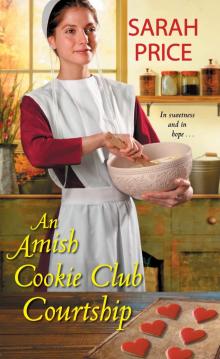 An Amish Cookie Club Courtship
An Amish Cookie Club Courtship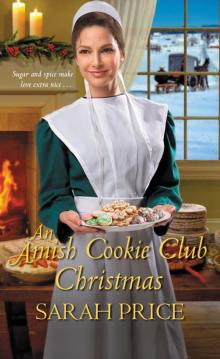 An Amish Cookie Club Christmas
An Amish Cookie Club Christmas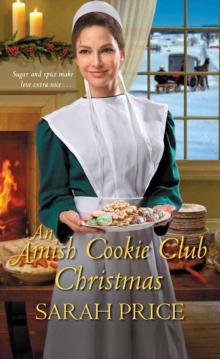 An Amish Cookie Club Christmas (The Amish Cookie Club Book 2)
An Amish Cookie Club Christmas (The Amish Cookie Club Book 2) Sadie: An Amish Retelling 0f Snow White (An Amish Fairytale Book 3)
Sadie: An Amish Retelling 0f Snow White (An Amish Fairytale Book 3) The Amish Cookie Club
The Amish Cookie Club Ella: An Amish Retelling 0f Cinderella (An Amish Fairytale Book 2)
Ella: An Amish Retelling 0f Cinderella (An Amish Fairytale Book 2) Sense & Sensibility: An Amish Tale of A Jane Austen's Classic (The Amish Classics Book 4)
Sense & Sensibility: An Amish Tale of A Jane Austen's Classic (The Amish Classics Book 4) First Impressions: An Amish Tale of Pride & Prejudice (The Amish Classics Book 1)
First Impressions: An Amish Tale of Pride & Prejudice (The Amish Classics Book 1) Second Chances: An Amish Tale of Jane Austen's Persuasion (The Amish Classics Book 3)
Second Chances: An Amish Tale of Jane Austen's Persuasion (The Amish Classics Book 3) Newbury Acres: An Amish Christian Romance Novel: An Amish Romance Adaptation of Jane Austen's Northanger Abbey (The Amish Classics)
Newbury Acres: An Amish Christian Romance Novel: An Amish Romance Adaptation of Jane Austen's Northanger Abbey (The Amish Classics) Postcards from Abby
Postcards from Abby Plain Christmas (Plain Fame Book 6)
Plain Christmas (Plain Fame Book 6) The Matchmaker: An Amish Tale of Jane Austen's Emma (The Amish Classics Book 2)
The Matchmaker: An Amish Tale of Jane Austen's Emma (The Amish Classics Book 2) The Amish Cookie Club (The Amish Cookie Club Book 1)
The Amish Cookie Club (The Amish Cookie Club Book 1) Cowgirl Cat: A Humorous Novel About the Healing Power of Horses (Cowgirl Cat Series Book 1)
Cowgirl Cat: A Humorous Novel About the Healing Power of Horses (Cowgirl Cat Series Book 1) The Divine Secrets of the Whoopie Pie Sisters: The Complete Trilogy
The Divine Secrets of the Whoopie Pie Sisters: The Complete Trilogy An Amish Christmas Carol
An Amish Christmas Carol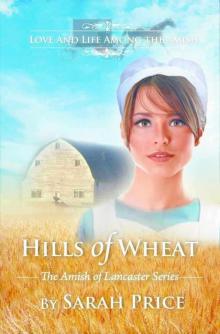 Hills of Wheat: The Amish of Lancaster
Hills of Wheat: The Amish of Lancaster Amish Faith: An Amish Christian Romance
Amish Faith: An Amish Christian Romance The Amish Seasons Collection: Contains An Amish Spring, An Amish Summer, An Amish Autumn, and An Amish Winter
The Amish Seasons Collection: Contains An Amish Spring, An Amish Summer, An Amish Autumn, and An Amish Winter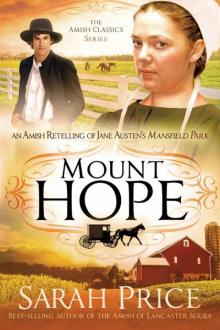 Mount Hope
Mount Hope Fields of Corn
Fields of Corn Fields of Corn: The Amish of Lancaster
Fields of Corn: The Amish of Lancaster Valley of Hope
Valley of Hope The Faded Photo
The Faded Photo The Amish of Ephrata Collection: Contains Four Books: The Tomato Path, The Quilting Bee, The Hope Chest, and The Clothes Line
The Amish of Ephrata Collection: Contains Four Books: The Tomato Path, The Quilting Bee, The Hope Chest, and The Clothes Line Pastures of Faith: The Amish of Lancaster
Pastures of Faith: The Amish of Lancaster An Empty Cup
An Empty Cup Sense and Sensibility
Sense and Sensibility The Matchmaker
The Matchmaker Gypsy in Black: The Romance of Gypsy Travelers
Gypsy in Black: The Romance of Gypsy Travelers Second Chances
Second Chances Life Regained (An Amish Friendship Series Book 1)
Life Regained (An Amish Friendship Series Book 1) Secret Sister
Secret Sister Belle
Belle Plain Change
Plain Change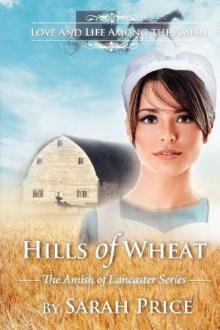 Hills of Wheat
Hills of Wheat Plain Again
Plain Again Sadie
Sadie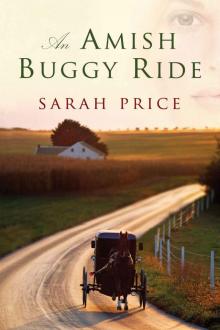 An Amish Buggy Ride
An Amish Buggy Ride First Impressions
First Impressions Plain Fame
Plain Fame Valley of Hope: The Amish of Lancaster
Valley of Hope: The Amish of Lancaster Amish Circle Letters - the Complete Series
Amish Circle Letters - the Complete Series Pastures of Faith
Pastures of Faith